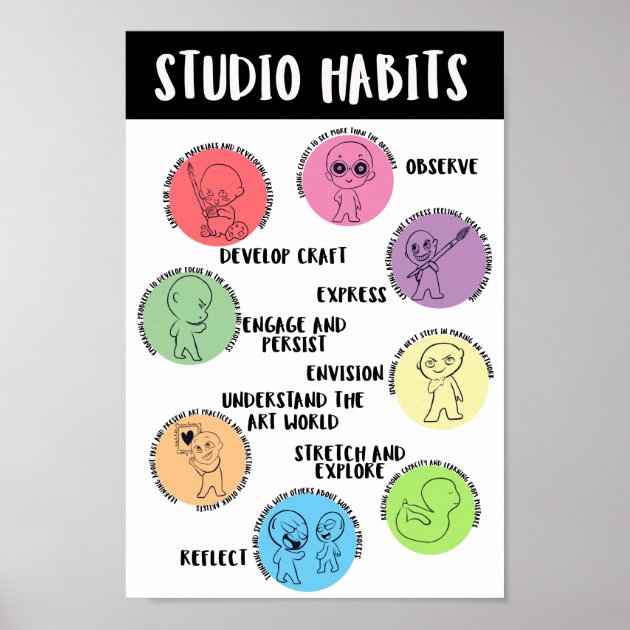

Observe: Learning to attend to visual contexts more closely than ordinary “looking” requires, and thereby to see things that otherwise might not be seen.Express: Learning to create works that convey an idea, a feeling, or a personal meaning.Envision: Learning to picture mentally what cannot be directly observed, and imagine possible next steps in making a piece.Engage & Persist: Learning to embrace problems of relevance within the art world and/or of personal importance, to develop focus conducive to working and persevering at tasks.Develop Craft: Learning to use tools, materials, artistic conventions and learning to care for tools, materials, and space.Further, exploring the pedagogy of art education posed additional thought and consideration to the teachers for their future practice and incorporation of the work of art, which is active, therefore not the same as the product of art into their classroom. The participants followed Dewey’s theory of knowledge in order to actively contribute to their own practice as well as contributing to the field of education. Reflections included themes ranging from pedagogy, planning, to self-improvement. Challenges from teaching art included budget, curriculum, and training. The small case study (n = 9) created individual narratives of each participant’s experience. Bricolage was employed to interpret meanings and analyze findings. Teachers were observed for one art lesson, to create a foundation to their everyday activity followed by a reflective discussion of the observation. The foundation of the research relies on Dewey’s theory of knowledge (experience + reflection = new knowledge). The heuristic foundation of this research is a reflective-formative style of inquire that is delicately entwined in the practice of language. The research follows hermeneutic phenomenology as it explains and gives voice to the lived experience.

The research project was designed to understand the lived experience of general elementary teachers teaching art when they are minimally trained and art education is devalued in schools and educational policy. Student speaking and listening skills improved significantly, as did teachers’ ability to promote oral language. Qualitative analysis of interview and survey data revealed that teachers perceived the theater and dance lessons to provide rich opportunities for verbal interaction between teachers and pupils. Speaking and listening skills were measured through standardized test scores. Attendance was significantly higher on days the artists visited absences were reduced by 10 percent. School engagement was measured by comparing attendance on days with and without scheduled arts lessons. Teaching artists visited each class weekly for 28 weeks, co-teaching theater and dance lessons with the teacher. Many of the children attending these schools spoke a language other than English at home. In this article, we look at the impact of an arts integration program offered at five large urban elementary schools on the daily attendance and oral language skills of children in kindergarten through second grade. The study’s findings and their implications for future research and practice concluded this study.
Stretch and explore studio habits of mind professional#
The wide variety of professional development experiences was noted and the high degree to which the professional development experiences were found to be beneficial was extensive. Conditions that supported and eroded a sense of teacher self-efficacy were examined and the effects reviewed. Surprisingly, prior arts experiences showed little to no significant correlation. A high degree of correlation was found between the following: studio habits and the teacher self-efficacy factors that impacted teachers’ decisions to attend an arts professional development and between the total number of professional development hours and arts integration. The study utilized four aspects of the work on studio habits: observe, envision, explore, and reflect (Hetland, Winner, Veenema, & Sheridan, 2007, 2013). Ii Allison Kleinsteuber DecemEducational Leadership THE IMPACT OF PROFESSIONAL DEVELOPMENT IN THE ARTS UPON HABITS OF MIND AND TEACHER EFFICACY Abstract This study employed a concurrent exploratory mixed-methods approach to discern the impact professional development in the arts had upon habits of mind and teacher self-efficacy.


 0 kommentar(er)
0 kommentar(er)
